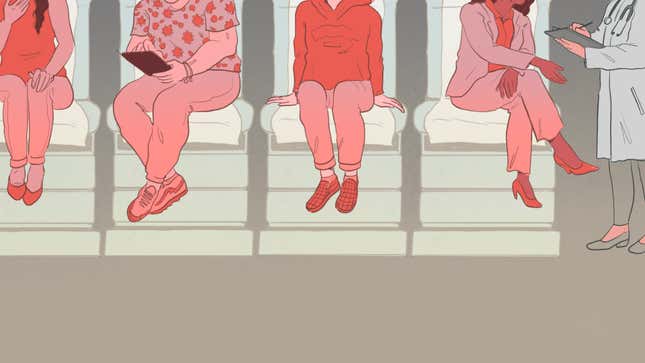You Are Not Owed a Reason for Somebody’s Abortion
For too long abortion stories were split into "good" and "bad." And as a journalist, I walked right into that trap.
In Depth
Illustration: Vicky Leta
Kaia was nearly 42 when she learned her fetus had a chromosomal abnormality that would likely lead to a painful death. Liz found out she was pregnant right after a long-distance relationship ended. Ophelia, already perimenopausal, was raising two children with mood disorders. Natalie wanted to be homecoming queen. Dima knew the dude wasn’t right. Layidua was undocumented and attempting to change her immigration status after getting married. Yas was about to start her senior year of high school. Deb had just graduated college.
I have interviewed dozens and dozens of people who had abortions for dozens of articles. I have spoken to people who chose to self-manage their medication abortions at home, who chose first-trimester abortions in hospitals and clinics, who got later abortions, multiple abortions, secret abortions, people who got abortions as minors, whose fetus wouldn’t survive, who did it to protect their health, who didn’t want to be parents ever or just not right now, and who couldn’t afford the procedure. Every one of these safe and wanted abortions was a good abortion.
After each interview I come away with profound disbelief that this is my life’s work: chronicling the stories of people who decide to divulge their private health information in service of others. They spill their abortion secrets in the hopes that their public honesty might mean those in power finally realize people who have abortions are simply that: people. I am so grateful for them. I wished I could offer them a better outcome than an accurate record of events. All I can offer them now is my own honesty.
It took me years to make so bold yet so fundamental a statement as “every safe and wanted abortion is a good abortion” on behalf of these people, because the notion of capital-J Journalism still had a hold over me. The profession has sworn, from William Randolph Hearst to Marty Baron, to not bring a point of view to practice; journalism forgets that Ida B. Wells was a reporter, too. I trained at newspapers in New Orleans, Seattle, and Phoenix. Even when I moved into political reporting, it was still a toe-the-line liberal blog. When I got to outlets that could take a bit more bite, I held back. I wrote about the fight for abortion access without explicitly mentioning the goodness of these choices. And I was fair, always trying to find the balance between pro- and anti-abortion sources and stories.
As I watch reproductive rights get stripped away, after years of my own professional cowardice, I know stopping short of being pro-abortion only does harm to the people I write about. A part of being fair is giving space to the entire world of abortion experiences—there are people whose abortions made them deeply sad and others who never thought twice about the decision, and those feelings exist in even the same person. But it’s no longer my full and honest account to write about the fight to ban abortion without saying I also believe in the right to abortion—and the right to abortion without judgement or indictment.
For decades, politicians succeeded in cleaving apart the reasons to get an abortion. It’s time for clarity. Last year, the Supreme Court heard a case that could end legal abortion as we know it. Last year, the state I love enacted legislation so cruel—no abortions after six weeks in Texas and the threat of civil legal action against anyone who helps—that it surprised even me. States across the country are clamoring to follow suit. And still, people who support abortion access are falling into traps that I did. They still take into account the reasons people want abortions. So, it’s time for clarity: No one owes us their reasons for having an abortion, and it is not our job to convey relief, give praise, or recoil at certain reasons for abortion if we do learn them. Abortions that are safe and necessary are good. When a person is able to take control of their own life, that is good.
-

-

-

-

-

-

-

-

-

-

-

-

-

-

-

-

-

-

-

-

-

-

-

-

-

-

-

-

-

-

-

-

-

-

-

-

-

-

-

-








































